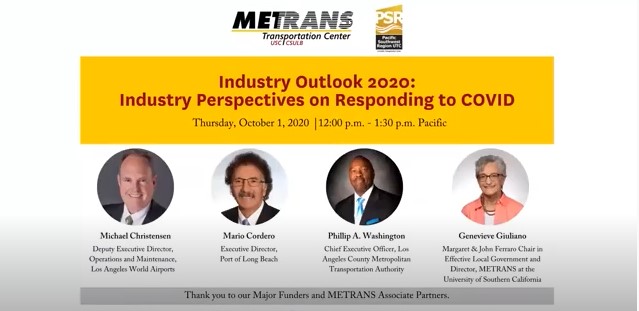News | METRANS Industry Outlook Convenes Industry Perspectives to COVID-19
Stop the VideoNews

METRANS UTC
METRANS Industry Outlook Convenes Industry Perspectives to COVID-19
Friday, October 30, 2020

This year’s METRANS Industry Outlook featured perspectives from leaders in transit, port, and aviation regarding their responses to the COVID-19 pandemic. The annual METRANS event was held virtually for the first time this year, which increased audience participation to include more global participants in addition to the traditional concentrations of Southern California participants.
Panelists for the October 1, 2020 Industry Outlook event were Michael Christensen, Deputy Executive Director, Operations and Maintenance for Los Angeles World Ports; Phillip A. Washington, Chief Executive Officer for LA Metro; and Mario Cordero, Executive Director of the Port of Long Beach. The meeting addressed the enormous drop in passenger travel that nearly emptied the airports and transit systems both globally and within the California region. The freight sector fared better than aviation and transit at the start of quarantine, but imports are still down and the current spike in e-commerce has not been offset by the general reduction seen in consumer demand.
METRANS Director Genevieve Giuliano, who served as moderator for the event, posed a range of questions that explored challenges during the pandemic faced by intermodal transportation professionals and their small business affiliates, opportunities for consolidations, labor cost reductions, workforce availability, and the long-term implications of these industry shifts.
Common themes expressed in the responses to COVID-19 for transportation industry sectors included workforce planning needs, business continuity, and the creation of a “new normal” standard. “Everybody’s business practices are changing. Business practices from who is going to be in the office and who is not going to be in the office to how do we manage illnesses in the future to how can we harness technology and so on. There’s a lot of thinking on how to change the traditional business model,” Giuliano noted.
All the panelists indicated that long-term changes to aviation, transit, and port-related business models will include some of the present adaptations created because of the pandemic. Currently, both aviation and transit industry leaders are looking to permanently adapt “touchless business” in everyday practices such as fare-less bus travel and screen-less touch services within airports.
Infrastructure is also an issue faced by internodal transportation during these times. Washington stressed the need for students in the transportation industry to utilize this time to learn as much as they can on flexibility and adaptability through uncertain times such as these. According to Washington, even if all the resources needed to improve infrastructure became readily available, there would not be enough trained workforce professionals to create it.
Cordero summarized the implications of the current world circumstances on the transportation industry stating, “I think we all agree going forward that this is one crisis that we are all going to learn from because of how unique the impact was.” The implications of COVID-19 on the transportation industry have raised challenges across all transportation sectors. Fortunately, panelists identified two other common themes, resiliency, and flexibility, which gave Christensen, Cordero, and Washington confidence in the workforces they lead.
News Archive
- December (1)
- November (6)
- October (4)
- September (2)
- August (3)
- July (4)
- June (3)
- May (7)
- April (8)
- March (11)
- February (8)
- January (7)
- December (7)
- November (8)
- October (11)
- September (11)
- August (4)
- July (10)
- June (9)
- May (2)
- April (12)
- March (8)
- February (7)
- January (11)
- December (11)
- November (5)
- October (16)
- September (7)
- August (5)
- July (13)
- June (5)
- May (5)
- April (7)
- March (5)
- February (3)
- January (4)
- December (4)
- November (5)
- October (5)
- September (4)
- August (4)
- July (6)
- June (8)
- May (4)
- April (6)
- March (6)
- February (7)
- January (7)
- December (8)
- November (8)
- October (8)
- September (15)
- August (5)
- July (6)
- June (7)
- May (5)
- April (8)
- March (7)
- February (10)
- January (12)















